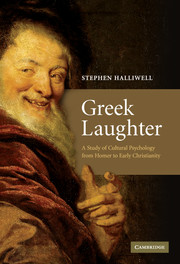Book contents
- Frontmatter
- Contents
- Preface
- Note to the reader
- Abbreviations
- 1 Introduction: Greek laughter in theory and practice
- 2 Inside and outside morality: the laughter of Homeric gods and men
- 3 Sympotic elation and resistance to death
- 4 Ritual laughter and the renewal of life
- 5 Aischrology, shame and Old Comedy
- 6 Greek philosophy and the ethics of ridicule
- 7 Greek laughter and the problem of the absurd
- 8 The intermittencies of laughter in Menander's social world
- 9 Lucian and the laughter of life and death
- 10 Laughter denied, laughter deferred: the antigelastic tendencies of early Christianity
- Appendix 1 The Greek (body) language of laughter and smiles
- Appendix 2 Gelastic faces in visual art
- Bibliography
- Index of selected authors and works
- Index of selected Greek terms
- General index
4 - Ritual laughter and the renewal of life
Published online by Cambridge University Press: 22 September 2009
- Frontmatter
- Contents
- Preface
- Note to the reader
- Abbreviations
- 1 Introduction: Greek laughter in theory and practice
- 2 Inside and outside morality: the laughter of Homeric gods and men
- 3 Sympotic elation and resistance to death
- 4 Ritual laughter and the renewal of life
- 5 Aischrology, shame and Old Comedy
- 6 Greek philosophy and the ethics of ridicule
- 7 Greek laughter and the problem of the absurd
- 8 The intermittencies of laughter in Menander's social world
- 9 Lucian and the laughter of life and death
- 10 Laughter denied, laughter deferred: the antigelastic tendencies of early Christianity
- Appendix 1 The Greek (body) language of laughter and smiles
- Appendix 2 Gelastic faces in visual art
- Bibliography
- Index of selected authors and works
- Index of selected Greek terms
- General index
Summary
φιλοπαίσμονες γὰρ καὶ οἱ θεοί.
(The gods too are lovers of play.)
PlatoGods take delight in mockery: it seems they cannot suppress laughter even during sacred rites.
NietzscheWORSHIPPING THE GODS WITH LAUGHTER
In a bizarre anecdote related by Theophrastus in his lost work On Comedy and preserved in paraphrase by Athenaeus, we are told that the people of Tiryns in the north-east Peloponnese once suffered from a pathological addiction to laughter which incapacitated them for the serious business of life. They consulted the Delphic oracle, which told them they could escape their affliction by throwing a bull into the sea as a sacrifice to Poseidon, but on one strict condition: that they did so in an atmosphere free from laughter (ἀγελαστί). Anxious to adhere to Apollo's instructions, the Tirynthians took the precaution of excluding children from the sacrificial ritual. But one child infiltrated the crowd. When caught and rebuked, he asked: ‘What's the matter? Are you afraid I'll upset your bull/bowl?’ The Tirynthians burst into laughter, apparently at an (accidental) pun on two senses of ‘upsetting’, i.e. enraging the sacrificial victim and overturning the bowl – a play on the imagery of wine and animal sacrifice that may also allude to the Tirynthians' reputation for intoxication. The episode taught the city just how hard if not impossible it was to be ‘cured’ of an inveterate habit.
- Type
- Chapter
- Information
- Greek LaughterA Study of Cultural Psychology from Homer to Early Christianity, pp. 155 - 214Publisher: Cambridge University PressPrint publication year: 2008



